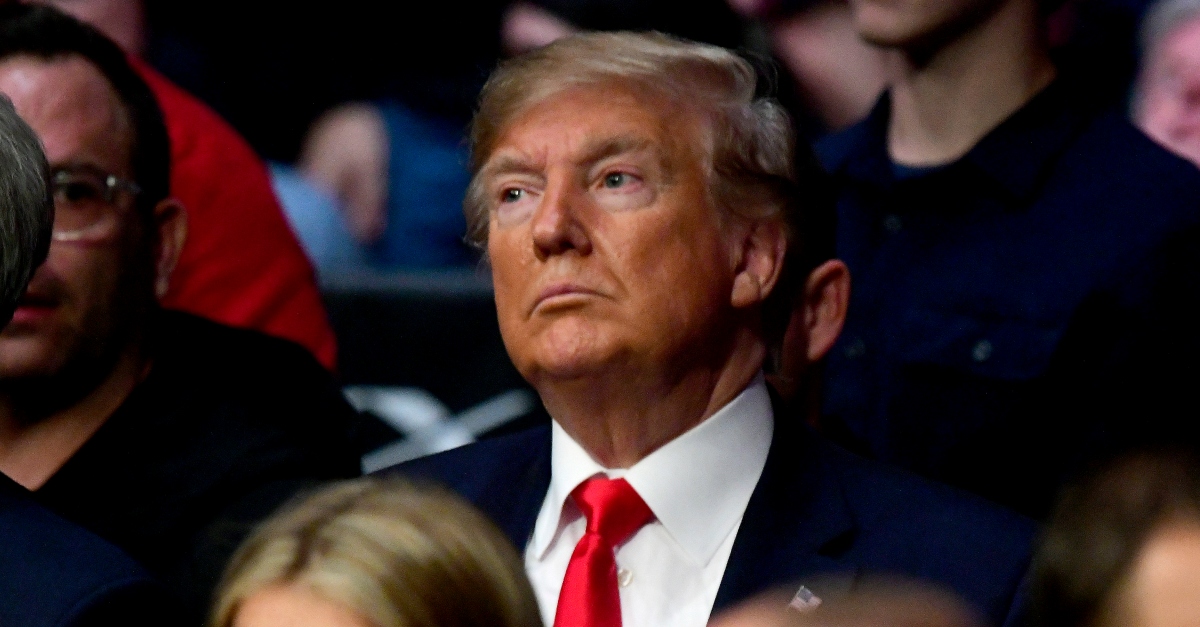
President Donald Trump’s impeachment defense team submitted a lengthy briefing arguing for dismissal on Monday afternoon. A largely political document, the briefing itself more or less dispenses with legal arguments in favor of red meat for those aggrieved elites who make up the elected members of the Republican Senate.
In service of the president’s goal to have the two articles of impeachment passed against him hastily dismissed, the 171-page broadside attack on the White House’s political opponents also purports to have discovered the science of time travel. In a sense.
One legal authority cited by the briefing is the Department of Justice’s Office of Legal Counsel (OLC) memo authored on Sunday, January 19, 2020.
Law&Crime previously reported on one of the many interesting arguments contained in that memo.
According to the DOJ OLC, any of the subpoenas issued by the House of Representatives prior to House Speaker Rep. Nancy Pelosi‘s (D-Calif.) official vote formalizing the impeachment process are considered invalid–precisely because they were issued before the impeachment process was formalized. That’s not really how congressional subpoenas work–but it’s something of a legal argument nonetheless.
The OLC memo itself, however, has one major problem of its own.
That is, the OLC memo purports to “memorialize” advice given to President Trump by executive branch lawyers in September, October and November of last year. Essentially, the OLC memo claims this advice was given in verbal–or some other non-formal–form and later committed to text by way of OLC Assistant Attorney General Steven A. Engel.
Here’s the advice in question–per the overall briefing:
Several Executive Branch officials refused to comply with subpoenas purportedly issued pursuant to an “impeachment inquiry” before the House had authorized any such inquiry, because, as OLC advised, the subpoenas were unauthorized and had no legal force.
And here’s the full footnote attached to that reasoning:
This advice was memorialized in a written opinion on January 19, 2020, which is attached as Appendix C. See Memorandum from Steven A. Engel, Assistant Attorney General, Office of Legal Counsel, to Pat A. Cipollone, Counsel to the President, Re: House Committees’ Authority to Investigate for Impeachment, at 1 (Jan. 19, 2020) (Impeachment Inquiry Authorization).
Now, let’s turn to the OLC memo itself.
“The [official impeachment] resolution did not purport to ratify any previously issued subpoenas or even make any mention of them,” Engel argues. “Accordingly, the pre-October 31 subpoenas…continued to lack compulsory force.”
And here’s the footnote to that piece of reasoning:
This opinion memorializes the advice we gave about subpoenas issued before October 31. We separately addressed some subpoenas issued after that date…
The memo goes on to argue about the House’s historic role and the powerful recourse of impeachment.
“The House has broadly delegated to committees its power to investigate for legislative purposes, but it has held impeachment authority more closely, granting authority to conduct particular impeachment investigations only as the need has arisen,” Engel continues. “The House has followed that approach from the very first impeachment inquiry through dozens more that have followed over the past 200 years, including every inquiry involving a President.”
But this time things went a bit differently, according to Engel, because Pelosi and other House Democrats attempted to pass the baton back-and-forth between the House’s legislatively-focused investigatory powers and the impeachment investigation. This, the Trump administration attorney argues, was a harm and a foul–and therefore the subpoenas issued before the formal impeachment vote could simply be ignored. Again, that’s not how congressional subpoenas work–but the argument contains a glimmer of logic.
All of that’s undone, however, when the source of this argument is considered.
According to OLC’s memo itself, the advice given in September, October and November of last year was based on a dissent authored by Circuit Judge Neomi Rao–Trump’s handpicked replacement for Brett Kavanaugh–in December of last year.
Again, the OLC memo:
The House does more than simply pick a label when it “debate[s] and decide[s] when it wishes to shift from legislating to impeaching” and to authorize a committee to take responsibility for “the grave and weighty process of impeachment.” Trump v. Mazars USA, LLP, 940 F.3d 710, 737, 738 (D.C. Cir. 2019), cert. granted, No. 19-715 (Dec. 13, 2019); see also id. at 757 (Rao, J., dissenting) (recognizing that “the Constitution forces the House to take accountability for its actions when investigating the President’s misconduct”).
Trial lawyer Max Kennerly has a tidy summary of the time-travel discovery at issue here:
The Trump / Barr OLC doesn’t even bother with the pretense of lawfulness. OLC’s memo, dated yesterday, supposedly “memorializes” how in Sept, Oct, & Nov 2019 they advised Trump to ignore subpoenas based upon… Judge Rao’s dissent in an unrelated case issued on Dec 13, 2019.🙄 pic.twitter.com/JOW2UFMRWE
— Max Kennerly (@MaxKennerly) January 20, 2020
That summary sparked even more chatter among legal observers as to the OLC’s rationale and tendencies.
Sure, but they haven’t explained when the informal advice was given, what it was based on if not Rao’s dissent, and why they get to keep citing dissents they happen to like as though they have the force of law, have they?
— southpaw (@nycsouthpaw) January 21, 2020
Wow. Pretty sad.
— Elizabeth de la Vega (@Delavegalaw) January 21, 2020
[image via Steven Ryan_Getty Images]